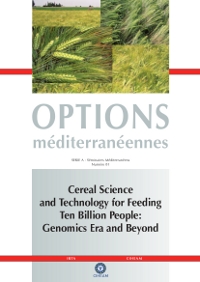| Article précédent | p. 369-372 | Article suivant |
Development of salt tolerant barley for sustainable agriculture in Kuwait
The combined effects of aridity and soil salinity limit the range of crops that can be produced in Kuwait. Fresh water is used to irrigate crops in Kuwait, but this is an expensive approach and research is needed to exploit brackish water resources. Continuous irrigation with brackish water has resulted in widespread salinization of farmlands in Kuwait. Salt-tolerant barley lines selected in this study are valuable in developing efficient agricultural systems for farmlands affected by salinity. Their use in combination with agronomic soil rejuvenation methods will allow the sustainable use of Kuwaiti resources and help bring into production areas considered unfit for cultivation. A wide range of barley genotypes (141) were tested for their responses to fresh and brackish water surface irrigation. The lines included: (i) two control cultivars recommended for their salt tolerant, Gustoe and California Mariout; (ii) a range of modern cultivars; (iii) a range of landrace barleys; (iv) a selection of wild barleys; (v) a selection of salt tolerant mutant lines; and (vi) hybrids. Various agronomic traits were tested, the most important being biomass as barley is used mainly for fodder in Kuwait. The two control genotypes performed well in brackish water as did semi-dwarf, Ari-e. mutants. Investigations of root traits showed that short rooted genotypes, had an advantage. Sustainable barley cultivation is feasible in Kuwait by careful consideration of soil type, local ground water, soil rejuvenation, water table control and genotype.
- [ Afficher ]
- [ Télécharger ]
- [ Exporter la citation ]
Vous pouvez télécharger la citation au format :
- [ Imprimer ]
-
Mots-clés
EXPERIMENTATION, GENOTYPE, KOWEIT, MUTANT, ORGE, SALINISATION DU SOL, TOLERANCE AU SELCiter cet article
Al Menaie H., Caligari P.D.S., Forster B.P. Development of salt tolerant barley for sustainable agriculture in Kuwait. In : Molina-Cano J.L. (ed.), Christou P. (ed.), Graner A. (ed.), Hammer K. (ed.), Jouve N. (ed.), Keller B. (ed.), Lasa J.M. (ed.), Powell W. (ed.), Royo C. (ed.), Shewry P. (ed.), Stanca A.M. (ed.). Cereal science and technology for feeding ten billion people: genomics era and beyond. Zaragoza : CIHEAM / IRTA, 2008. p. 369-372. (Options Méditerranéennes : Série A. Séminaires Méditerranéens; n. 81). Meeting of the Eucarpia Cereal Section, 2006/11/13-17, Lleida (Spain). http://om.ciheam.org/om/pdf/a81/00800881.pdf



